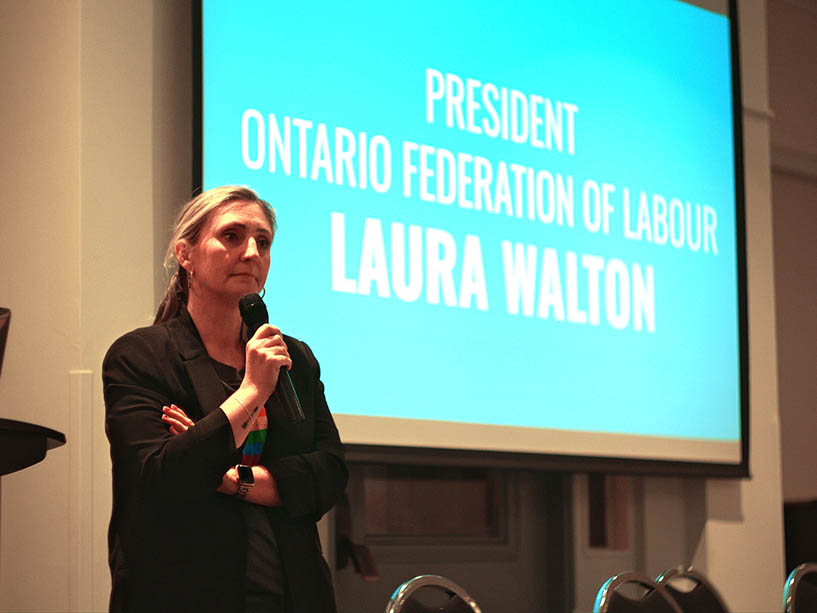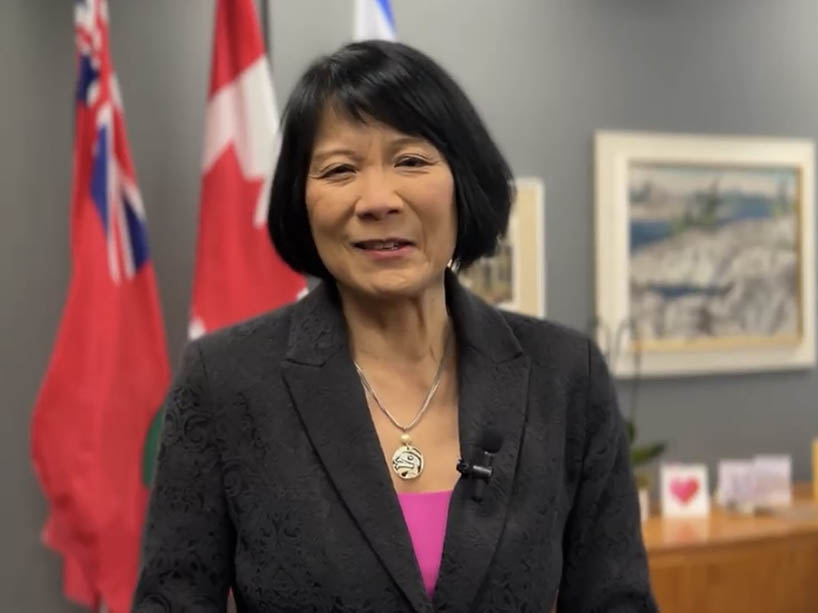Students: what does better work look like to you?

On a very snowy night in late February, TMU researchers hosted Ontario union leader Laura Walton and a panel of young workers featuring three TMU students who are striving to make work better – and sharing their stories so other students can too. Photo by Jonathan Cheung-Budd
What do young workers want from their work? What makes bad work and what would make the work better? These key questions are what the TMU research team behind the Better Work Project: Young Workers Making Change set out to answer.
In an event at TMU last month, research project co-leaders Andie Noack (Sociology) and Myer Siemiatycki, (professor emeritus, Politics and past coordinator of TMU’s Young Workers Rights Hub), hosted a lively discussion on challenging bad work to build better workplaces. Several prominent voices including keynote presentations by Toronto Mayor Olivia Chow (herself a former TMU instructor) and Ontario Federation of Labour President Laura Walton delved into the experiences of young people in the workforce.
What the team learned
Last year, Siemiatycki and Noack led the research project, surveying over 1,000 young workers and conducting over 40 in-depth interviews to identify the challenges and aspirations young people face in a changing labour market. The project’s research team also included graduate students Mackenzie Agard (TMU, Communication & Culture), Asmita Bhutani Vij (OISE) and Sophia Ricciardone (TMU, Communications & Culture).
The research project discovered that the most important thing for young people when it comes to work is being treated fairly and paid fairly – 81 per cent of respondents ranked this as extremely important. But nearly half of the respondents reported that their work fell short of these goals.
Among those surveyed, job quit rates were especially high for young people with disabilities, as well as Indigenous, female, non-binary and racialized young people.
Based on their findings, the research team produced a series of 17 videos for social media that amplify the voices of young workers and share potential strategies for change, including encouraging young people to expect better at work, and – yes – beat back bad work. Some things the panel discussed and the videos cover include denormalizing “grind” culture, or the demand to over-work, stamping out bullying in the workplace and understanding what wage theft is and calling it out.
To see the full video series, visit the Better Work Canada website (external link) .

Mayor Olivia Chow prepared a special video message for students in attendance at the event, encouraging them to get inspired to fight for better work.
Mayor Chow spoke of her own experience as a young worker, and the poor conditions she faced. “Growing up, my mom worked as a hotel maid, and she faced a lot of racist discrimination at work. But fortunately, she had a union to back her up,” she said. “I saw first hand what a union can do to back up the workers who face injustice. And I wish all workers had a union to back them up too. I sure didn’t.”
Chow spoke of her experience in the serving industry in her youth, with an unpredictable schedule and the injurious conditions. “No one knew their rights, everyone was just trying to survive.”
She encouraged the audience to learn, connect and get inspired to work for change.
A wonderful evening at the Beat Back Bad Work forum hosted by @betterworkca at the Toronto Metropolitan Students' Centre. These young workers are building the fight for decent work! @WorkersAC @GigWorkersUnite @UFCWCanada @NSNPeel @OFLabour #Justice4Workers #ONpoli #BetterWork pic.twitter.com/ynl9ItI8GB
— Justice for Workers (@fairwagesnow) February 29, 2024
Students speak out
And several people in attendance already have, including the young worker panel which included three TMU community members: theatre grad Greta Whipple who successfully organized a union drive at Indigo Yorkdale, and is now a staff organizer for the United Food and Commercial Workers Union; Shirin Naghizadeh, a social work student and president of TMU Student Worker Alliance; and Fabiha Tahsin, a social work student with a lead position with TMU Student Worker Alliance.
The panellists answered a series of questions from the audience, including what they think the biggest pressures young workers are facing today.
“The social contract has been broken,” responded Whipple. “There's a quality of life that our parents and grandparents enjoyed, and it's just not on the table for us all. The cost of living is untenable.”
Tahsin stressed how the fight for labour rights is connected to other fights: “It’s very much tied to racial justice. They come together because temp agency work, gig work and app-based work, a lot of these jobs are being filled by people from low income backgrounds or women of colour. When we fight to lift rights for workers, we do that for everyone.”
‘Lean in and make your job better’
Laura Walton, president of the Ontario Federation of Labor, shared that being surrounded by the room of young workers, she felt like one herself again. In his introduction of her, Siemiatycki said Walton “led the most important worker strike in Ontario for a very, very long time,” referring to the two-day strike in November 2022, where 55,000 education workers withdrew their labour to fight for a living wage.
For students who are facing unfavourable working conditions, Walton had one piece of advice:
“At work, how many of you have felt like ‘I can't do this anymore’? Typically, when you say that, somebody says ‘well go get another job,’ right? Instead of doing that, I'm going to challenge you: I want you to lean in and make your job better.”
The project received funding from the Future Skills Centre, and its research director Tricia Williams told the audience this project highlighted the importance of skills development for young workers.
For students who would like to find more resources to make their work better, visit the Young Workers Rights Hub.
Related:





